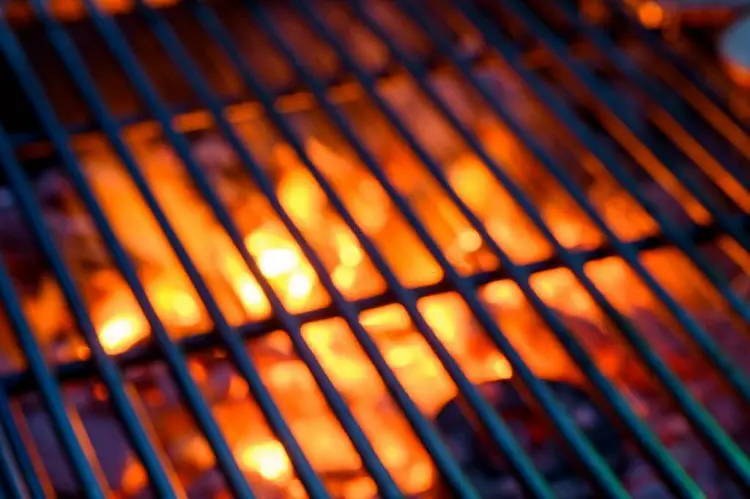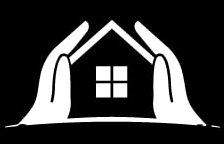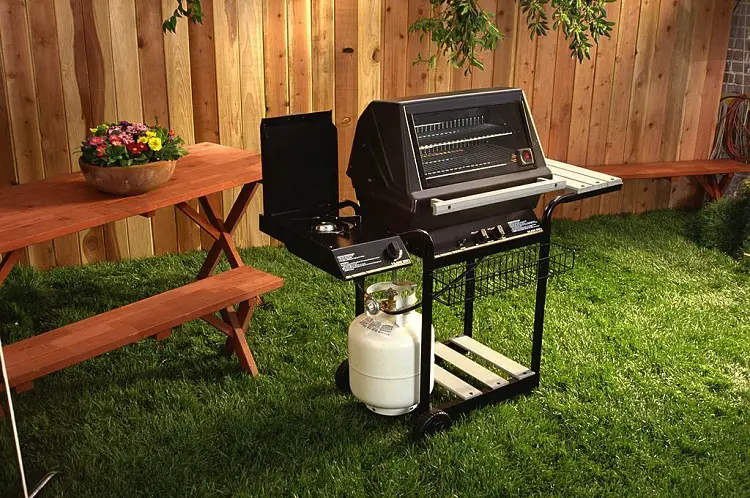Cooking with gas is great, but there must be no oozing of gas.
While a bit of gas is acceptable when using a grill for a barbecue, if it becomes longer or continuous, it can be a source of worry.
If your grill smells like propane, it’s a sign that you may be experiencing the following
- Your propane tank is running low
- The gas line is not connected properly
- There is a gas leak. You need to check out for gas leakage.
Table of Contents
- Should You Smell Propane While Grilling?
- Why Your Grill Smells Like Propane
- What To Do If Your Grill Smells Like Propane
- Conclusion
Should You Smell Propane While Grilling?
When grilling, it is not normal to constantly smell propane. While a slight odor may occur when you first light a gas grill, it should not be a cause for concern.
However, if the smell becomes continuous, it is important to take immediate action. In such a situation, you should turn off your grill and shut off the fuel line before proceeding.
This will help prevent any potential hazards that may arise due to a gas leak. It is crucial to always prioritize safety when using gas grills to ensure a safe and enjoyable grilling experience.
Why Your Grill Smells Like Propane

If your grill smells like propane, there are a few potential reasons for this issue:
1. Leaking Connections
Propane gas grills are popular for their convenience and ease of use. They operate by using hoses and connections to deliver propane gas from the tank to the burners, where it is ignited to produce the heat needed for cooking.
However, it is important to ensure that all connections are properly secured and maintained, as any leak can result in the smell of propane around the grill.
Leaks can occur due to a variety of reasons, including damaged or worn-out hoses, loose connections, or faulty regulators.
It is recommended to inspect and test all connections regularly to ensure the safe operation of your propane grill.
2. Regulator Issues
As you may already know, the regulator plays a vital role in controlling the flow of gas from the propane tank to the burners.
It is responsible for ensuring that the gas is delivered at a consistent and safe pressure for optimal performance.
However, if the regulator malfunctions, it can lead to an uneven or excessive flow of gas, which can cause a propane smell.
Therefore, it is crucial to regularly inspect and maintain the regulator to prevent any potential safety hazards and ensure that it is functioning correctly.
3. Overfilled Propane Tank
Overfilling the propane tank beyond its capacity can result in an excess gas buildup. This buildup can eventually cause the pressure relief valve to open, allowing the gas to escape into the atmosphere.
When this happens, you may notice a strong odor of propane around your grill, which is a clear indication of a gas leak.
It’s important to address this issue immediately and ensure that you follow proper safety procedures when handling propane tanks to prevent any potential hazards.
4. Residual Gas
Sometimes, residual propane gas can accumulate in the grill’s burners or components when the grill is not in use. This can lead to a propane smell when you start the grill.
5. Poor Ventilation
Using a gas grill in an enclosed or poorly ventilated space can result in a dangerous accumulation of propane fumes, which can lead to the distinct scent of propane gas.
This smell can be a sign of a potentially hazardous situation, as propane gas is highly flammable and can cause an explosion in the presence of a spark or flame.
6. Grease and Food Residue
It’s common for grease and food residue to build up on the burners and other parts of a grill over time.
When you light up the grill, the heat can cause these residues to burn, which in turn can produce an odor that’s similar to propane. This odor can be quite strong and may even be mistaken for a gas leak by some people.
7. New Grill
When you purchase a new grill, it’s not unusual to notice a faint propane scent during the initial use.
This is because the grill’s burners are burning off any oils, dust, or manufacturing residues that might have accumulated during the manufacturing process.
These residues can produce a smell that resembles propane gas. This process is entirely normal and safe, and it should not cause any concern.
8. Damaged or Worn Hoses
Over time, the hoses that connect the propane tank to the grill’s burners can become damaged, cracked, or worn out. This can lead to gas leaks. Inspect the hoses regularly for any signs of wear and tear.
9. Loose Connections
If the connections between the propane tank, hoses, and grill components are not properly tightened, gas can escape. Always ensure that connections are securely fastened.
10. Improper Assembly
Incorrect assembly of the grill components, including hoses and connections, can lead to gas leaks. Make sure you follow the manufacturer’s instructions carefully when assembling your grill.
11. Corrosion
Corrosion can weaken the metal parts of the grill over time, potentially leading to gas leaks. Regular maintenance and cleaning can help prevent corrosion.
What To Do If Your Grill Smells Like Propane
If your grill smells like propane, it could indicate a potential safety concern. Propane is an odorless gas, but a distinct odorant is added to it so that people can easily detect leaks.
If you’re smelling propane around your grill, it’s important to take the following steps:
1. Turn Off the Gas
If you are currently grilling, it is crucial to take necessary safety precautions to prevent any potential hazards.
One of the most important measures to take is to immediately turn off the gas supply to the grill. This will help ensure that no gas leaks occur, which can lead to fires or even explosions.
It is also recommended to keep a fire extinguisher nearby and to never leave the grill unattended while it is in use.
2. Stop Using the Grill
If you’re currently using the grill and you detect a strong propane smell, it’s crucial to act immediately to ensure your safety. Turn off the grill and the propane tank valve, and move away from the area.
Avoid using any electrical switches or devices, including cell phones, as these could ignite a potential gas leak.
3. Use a Leak Detection Solution
If you’re uncertain about the presence of a leak, you can use a mixture of soapy water to check for bubbles at the connections.
Apply the solution to the connections and watch for any bubbles forming, indicating a leak. If you find a leak, turn off the gas and address the issue before using the grill.
4. Check for Leaks
Inspect the propane tank and the connections between the tank, regulator, and burners. Look for any visible signs of damage, rust, or wear.
You can also use a mixture of soapy water applied to the connections – if you see bubbles forming, it indicates a leak.
If you’ve been noticing a lingering smell of propane on your gas grill lately, it could be due to a buildup of residues or grease on the grill’s components or burners.
To address this issue, it’s important to give your grill a thorough cleaning. Start by removing any debris or leftover food particles from the grates and other surfaces using a grill brush or scraper.
Next, clean the components and burners with soapy water and a nylon brush, making sure to remove any built-up grease or residue.
Finally, rinse everything thoroughly with clean water and dry it completely before using the grill again.
6. Ventilate the Area
If you suspect a propane leak, it’s important to move to a well-ventilated area away from the grill. Propane is flammable, and breathing in high concentrations of it can be dangerous.
7. Check Hose Connections
Before turning on the grill, it is important to check that the hose connecting the propane tank to the grill is securely attached.
Make sure to inspect the hose for any signs of damage or kinks that may hinder the flow of gas. It’s crucial to ensure that the hose is free from any punctures, cracks, or leaks, as this can pose a serious safety hazard.
8. Replace Components
If you detect a propane smell coming from your grill, it’s crucial to address the issue as it can be a sign of a faulty component, such as the regulator or hose.
To avoid any potential hazards, it’s recommended to immediately turn off the gas valve and disconnect the propane tank.
Once the grill has cooled down, inspect the regulator and hose for any signs of wear, damage, or cracks.
If you notice any issues with these components, it’s important to replace them as soon as possible to prevent any further risks of gas leaks or propane smells.
9. Contact Professionals
If you’re unable to identify the source of the propane smell or if you confirm a leak, it’s best to contact a professional.
This could be your propane supplier, a gas technician, or the appropriate authorities, depending on the situation.
Remember that safety is paramount when dealing with propane. It’s always better to err on the side of caution and seek professional assistance if you have any concerns about propane leaks or unusual smells.
Related Posts:
Conclusion
Whenever your grill smells like propane then you should know that it is a serious safety issue. It is not normal that you should always perceive the smell of propane while grilling.
Although a bit of odor when you first light a gas grill is not a bad thing it should be a source of worry when the smell becomes continuous then you have got to immediately turn off your grill and shut off the fuel line before proceeding.
If you smell gas while operating your grill, it is likely caused by one of the following issues: Your propane tank is running low, the gas line is not connected properly or there is a gas leak.

